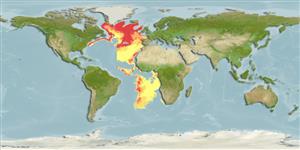Teleostei (teleosts) >
Lophiiformes (Anglerfishes) >
Gigantactinidae (Whipnose anglers)
Etymology: Gigantactis: Greek, 'gigas' or 'gigantos' = gigantic + Greek, 'aktis' = ray (referring to the unusually long first dorsal-fin spine that functions as a lure in this genus) (Ref. 86949).
Environment: milieu / climate zone / depth range / distribution range
Ecology
Marine; bathypelagic; depth range 1000 - 2300 m (Ref. 86949). Deep-water
Atlantic and Pacific: tropical and temperate regions. A single male is known from the Gulf of Guinea.
Size / Weight / Age
Maturity: Lm ? range ? - ? cm
Max length : 22.1 cm (female)
Dorsal soft rays (total): 8 - 10; Anal soft rays: 6 - 8. Characterized by having relatively high number of dorsal fin rays 8-10; metamorphosed females characterized by: having 3 or fewer distal escal filaments, proximal anterolateral group of short filaments, and posterior proximal group of long filaments; first and last dorsal fin rays distinctly longer than intermediate rays; length of illicium less than 120%SL; escal bulb without distal prolongation or papillae; relatively long dentary, in five or six longitudinal series; prolonged first and eighth rays of caudal fin, 60-100%SL. Metamorphosed male: eyes small, diameter 0.45-0.5 mm; olfactory lamellae 11; upper denticular teeth 3; lower denticular teeth 4; skin naked, unpigmented. Larvae: lacking dorsal subdermal pigment (Ref. 86949).
Also mesopelagic (Ref. 10761).
Life cycle and mating behavior
Maturities | Reproduction | Spawnings | Egg(s) | Fecundities | Larvae
Bertelsen, E., 1990. Gigantactinidae. p. 513-515. In J. C. Quero, J. C. Hureau, C. Karrer, A. Post and L. Saldanha (eds.) Check-list of the fishes of the eastern tropical Atlantic (CLOFETA). JNICT, Lisbon; SEI, Paris; and UNESCO, Paris. Vol. 1. (Ref. 10761)
IUCN Red List Status (Ref. 130435)
Threat to humans
Harmless
Human uses
Tools
Special reports
Download XML
Internet sources
Estimates based on models
Preferred temperature (Ref.
123201): 2.8 - 2.9, mean 2.9 °C (based on 5 cells).
Phylogenetic diversity index (Ref.
82804): PD
50 = 0.5000 [Uniqueness, from 0.5 = low to 2.0 = high].
Bayesian length-weight: a=0.01000 (0.00244 - 0.04107), b=3.04 (2.81 - 3.27), in cm total length, based on all LWR estimates for this body shape (Ref.
93245).
Trophic level (Ref.
69278): 4.1 ±0.7 se; based on size and trophs of closest relatives
Fishing Vulnerability (Ref.
59153): Low vulnerability (20 of 100).
